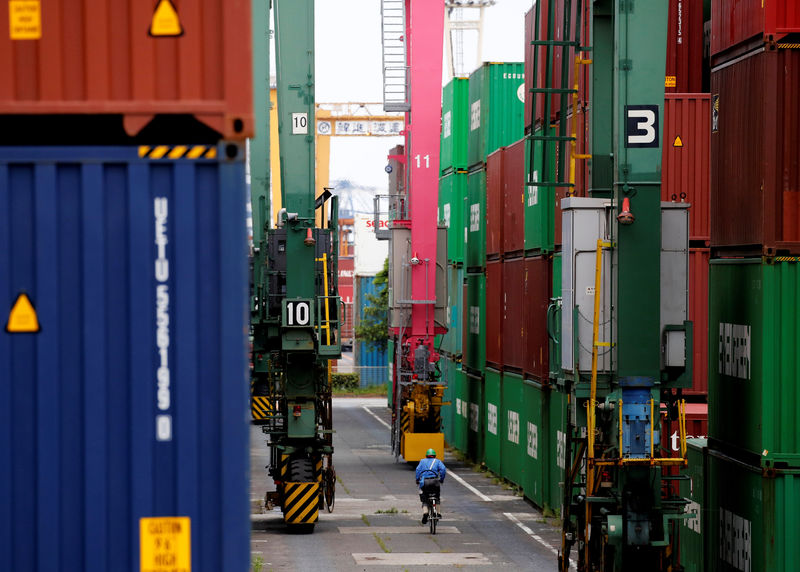By Daniel Leussink
TOKYO (Reuters) - Japan's exports contracted for a 10th straight month in September, adding to speculation the central bank could ease monetary policy as soon as next week to support an economy hit by a slowdown in global demand.
A bitter Sino-U.S. trade war and slowing growth in China have heightened the risks of a global recession, darkening the outlook for Japan's economy, the world's third-largest.
Exports in September slumped 5.2% from a year earlier, Ministry of Finance data showed on Monday, dragged down by car and airplane parts to the United States and semiconductor production equipment to South Korea.
The fall was larger than a 4.0% drop expected by economists and marked the longest run of declines in exports since a 14-month stretch from October 2015 to November 2016.
In volume terms, exports fell 2.3% in the year to September, the second consecutive month of declines.
The extended fall in exports comes after the government lowered its assessment of the economy on Friday, raising a warning flag over weakness in exports.
That, among other factors, has triggered calls from some Japanese policymakers the government is ready to take fiscal measures if extra economic support was needed.
"There is a possibility that there will be another fall in exports hereafter," said Yuichi Kodama, chief economist at Meiji Yasuda Life Insurance.
"Though overall conditions are currently stable, it would become a factor for monetary easing if it did affect Japan's economy as a whole."
Markets are rife with speculation the Bank of Japan could ease at its Oct. 30-31 meeting, after it said at its rate review last month it would take a more thorough look at whether rising overseas risks could derail Japan's fragile economic recovery.
The BOJ will "certainly" reduce short- to medium-term interest rates if it needed to ease monetary policy, Governor Haruhiko Kuroda told Reuters on Saturday.
By region, exports to China, Japan's biggest trading partner, slipped 6.7% year-on-year in September, down for the seventh month as shipments of auto parts declined, offsetting a rise in those of electronic chips for semiconductors.
Exports to Asia - which account for more than half of Japan's overall exports - dropped 7.8% in the year to September, falling for the 11th month, hurt by a 18.7% slide in semiconductor manufacturing parts, especially those to South Korea, which has been in a trade dispute with Japan.
Japan's exports to the United States fell 7.9% in the year to September, weighed down by reduced shipments of cars over 3000cc and aircraft motors and parts.
Imports from the United States slipped 11.6% in September, causing Japan's trade surplus with the world's top economy to narrow by 3.5% from a year earlier to 564.1 billion yen ($5.2 billion), the trade data showed.
Washington and Tokyo signed a limited trade deal last month that cuts tariffs on U.S. farm goods, Japanese machine tools and other products while further reducing the threat of higher U.S. car duties.
Japan's overall imports dropped 1.5% year-on-year, a smaller decline than the median estimate for a 2.8% decrease.
In volume terms, imports gained 6.8% which analysts said was largely because of front-load demand before a nationwide sales tax hike to 10% from 8% which kicked in at the start of this month.
"Going forward, imports are going to decline as consumption will be hurt" by the tax hike, said Takeshi Minami, chief economist at Norinchukin Research Institute.
"The trade deficit is likely going to be reduced over the coming months."

The trade balance came to a deficit of 123.0 billion yen, versus a 54.0 billion yen surplus seen by economists.